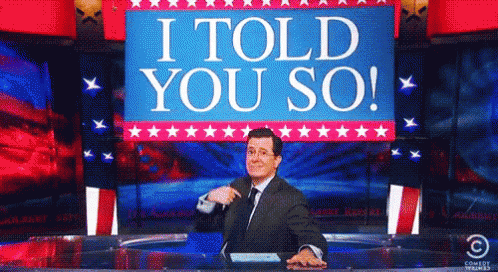(this page viewed 11,755 times in a single year )
( for ![]() or
or
![]() )
)
(this page viewed 11,755 times in a single year )
|
The massive (but under-reported) 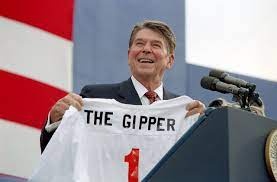 Reagan Administration corruption |
|---|
Conservatives and Republicans are such paragons of virtue and truth that they tried to pin Ronald Reagan's "most corrupt administration in American history" medal on Bill Clinton!
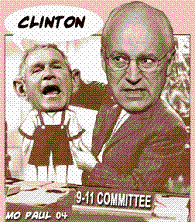 Despite the fact that the President and first lady, and many members of the Clinton administration were deluged with charges of criminal behavior on the street and in the media, their accusers fell flat on their faces when they had to prove their trumped up charges in court, where it's evidence and proof that matter - not claims that a good lawyer can show to be devoid of serious credibility. -
Despite the fact that the President and first lady, and many members of the Clinton administration were deluged with charges of criminal behavior on the street and in the media, their accusers fell flat on their faces when they had to prove their trumped up charges in court, where it's evidence and proof that matter - not claims that a good lawyer can show to be devoid of serious credibility. -
Contrast that to the great numbers of the Republican administration of Ronald Reagan who were not just charged, but were found guilty, in court! How can it be that most Americans don't remember the Reagan administration for its corruption? It couldn't possible be because the so-called "Liberal media" rarely, if ever, shines its powerful spotlights on that part of U.S. history? My spotlight is nowhere as strong as theirs, but if enough of us help to spread the word, maybe we can make up for that deficiency.
The contenders for the title of "the most corrupt administration in American history" are all Republican administrations. It may be hard to order them exactly, but the contenders for the first, second, third & fourth "most corrupt administrations in American history" are the Republican administrations of Grant, Harding, Nixon and Reagan.
| ||||
"By the end of his term, 138 Reagan administration officials had been convicted, had been indicted, or had been the subject of official investigations for official misconduct and/or criminal violations. In terms of number of officials involved, the record of his administration was the worst ever."
from p. 184,Sleep-Walking Through History: America in the Reagan Years, by Haynes Johnson, (1991, Doubleday), as are the examples below:
Two types of problems typified the ethical misconduct cases of the Reagan years, and both had heavy consequences to citizens everywhere. One stemmed from ideology and deregulatory impulses run amok; the other, from classic corruption on a grand scale.
* The Pentagon procurement scandal, which resulted from the Republicans' enormous infusion of money too quickly into the Defense Department after the lean Carter years .
* Massive fraud and mismanagement in the Department of Housing and Urban Development throughout Reagan's eight years. These were finally documented in congressional hearings in spring 1989, after Reagan left office. Cost the taxpayers billions of dollars in losses. What made this scandal most shameful was that Reagan's' friends and fixers profited at the expense of the poor, the very people HUD and the federal government were pledged to assist through low-income housing. . .
Despite their many public lies about the matter, it was eventually proven that the Sales of weapons to Iran, followed by illegal financial support of the Central American Contras were carried out with the knowledge of, among others, President Ronald Reagan, Vice President George Bush, Secretary of State George P. Shultz, Secretary of Defense Caspar W. Weinberger, Director of Central Intelligence William J. Casey, and national security advisers Robert C. McFarlane and John M. Poindexter. Of these officials, only Weinberger and Shultz dissented from the policy decision. Weinberger eventually acquiesced and ordered the Department of Defense to provide the necessary arms. Large volumes of highly relevant, contemporaneously created documents were systematically and willfully withheld from investigators by several Reagan Administration officials in an attempt to cover up the administration's extensive corruption.
At the nationally broadcast state funeral for President Ronald Reagan, his son Ronald, Jr. said of Reagan that while he was "deeply and unabashedly religious, he never made the fatal mistake of so many politicians - wearing his faith on his sleeve to gain political advantage." He made it clear later that he was speaking of people like President George W. Bush.
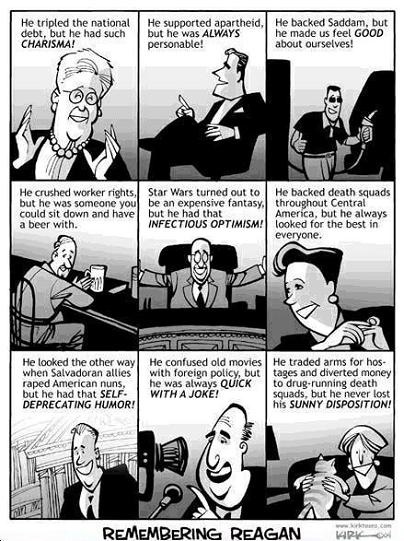
Geocities.com/thereaganyears/divineguidance.htm shows that the Reagans' idea of "Divine Guidance" was fortune-tellers:
"Virtually every major move and decision the Reagans made during my time as White House Chief of Staff was cleared in advance with a woman in San Francisco who drew up horoscopes to make certain that the planets were in a favorable alignment for the enterprise."
Donald Regan (Reagan's former chief of staff),"It wasn't widely circulated until the publication of Donald Regan's memoir, For the Record in 1988, that President Reagan and his influential wife sought the advice of an astrologer. Time magazine would later identify Ron and Nancy's chart reader as being San Francisco astrologist Joan Quigley. Quigley was not the first astrologer the Reagans had consulted. Ronald and Nancy Reagan had a long history of involvement with astrologers and psychics. During the 1950's and 1960's, Ron and Nancy enlisted the services of Hollywood astrologer Carroll Righter, and later Jeanne Dixon. In his 1965 autobiography, Where's the Rest of Me?, Reagan said that he and Righter were friends, and that he and Nancy read Righter's column "regularly." (It was on Righter's advice that Reagan postponed his inauguration as governor of California for 9 minutes until the auspicious moment of 12:10 a.m.)"
"For fundamentalist preachers like Pat Robertson and Jerry Falwell - who proclaimed Reagan a standard-bearer of Christian righteousness - the astrology matter should have been of particular concern. Astrology is a branch of the occult and is inimical to Christianity. However, if the fundamentalist leaders were concerned or embarrassed by the astrology revelations, they didn't show it. (They also ignored the fact that Reagan rarely attended church.)"
March 19, 2002 (Political Sanity/APJP)
-
Let's begin our examination of the real Reagan Legacy by taking a look at
myth number one:
This is utterly absurd. Economic growth indices - GDP,
jobs, revenues - were all positive when Carter left office. All plunged after Reagan policies took effect. . . .
Another major myth :
In reality, Reagan did nothing to bring down the Soviet
Union.
By 1980, the Soviet Union was trying to cut its own
defense spending. Reagan made it harder for them to do so. In fact, Reagan
increased the possibility of a nuclear war because he was - frankly, and
sadly - senile. He thought we could actually recall submarine-launched
nuclear missiles (talk about a Reagan myth), and bullied the Soviets to
highest alert several times.
Critically, Reagan never even tried to bring down the
Soviet Union.
Wasteful overspending on defense didn't end the Soviet
Union. In fact, it played into the hands of authoritarian "Communist"
hard-liners in the Kremlin. Reagan thought the Soviet Union was more powerful
than we were. He was trying to close what he called "the window of
vulnerability."
This was sheer idiocy.
No general in our military would trade our armed forces
for theirs. If it were to happen, none of the Soviet military command would
turn down that deal. We had better systems, better troops, and better
morale.
Here's the truth: we'd already won the Cold War before
Reagan took office. All Reagan needed to do was continue the tried-and-true
containment policies Harry S. Truman began and all subsequent presidents
employed. The Soviet Union was collapsing from within. The CIA actually told
this to Reagan as he took office.
Here's an example: the Soviet Union military couldn't deal
with a weak state on its own border, the poor, undermanned Afghanistan. Most
of the Soviets' military might had to make sure its "allies" in the Warsaw
Pact and subjects along the South Asian front didn't revolt. Even Richard
Nixon told Reagan he could balance the budget with big defense cuts.
Reagan ignored this, and wrecked our budget.
We didn't have to increase weapons spending, but Reagan
didn't care. He ran away from summits with the dying old-guard Soviets, and
the new-style "glasnost" leadership of Mikhail Gorbachev baffled the witless
Reagan and his closed-minded extremist advisors.
Maggie Thatcher finally cajoled the Gipper into meeting
Gorby, and Gorby cleaned Reagan's clock. Reagan's hard-right "handlers" nearly
had to drag Reagan out of the room before he signed away our entire nuclear
deterrent. Reagan - and the planet - was lucky Gorbachev sought genuine and
stable peace. Had Yuri Andropov's health held, Reagan's "jokes" and gaffes
might have caused World War III.
Eventually Reagan even gave Gorbachev his seal of
approval. Visiting Moscow before the August Coup, Reagan said the Soviet Union
was no longer the "Evil Empire." He predicted his friend Gorbachev would lead
the Soviet Union for many years to come.
As usual, Reagan was wrong. A few months later,
disgruntled military officers kidnapped Gorbachev, throwing him out of power
forever. Reagan remained disengaged: nothing he did caused the coup, and
nothing he did made the Soviet military support Boris Yeltsin over their
superiors.
We're all fortunate things happened as they did - but
once again, Reagan did nothing to make this fluke more likely.
All this is vintage Reagan. Reagan took credit for others'
hard word and hard choices, and blamed them for his failures. Reagan even
blamed Jimmy Carter for Reagan's foolish, fatal, and reckless decision to
leave 243 Marines stationed in Beirut, helpless and unguarded.
Reagan hired over 100 crooks to run our government, and
broke several laws himself. His policies were almost uniformly self-defeating,
wrong-headed, immoral and unfair.
Reagan was an actor playing the part of the president. He was style over substance; lucky, not good. And once the myths are stripped from the "legacy", the
truth becomes obvious:
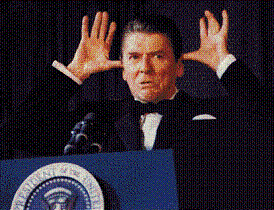
Most people who have any memory of the Reagan years remember that he caused almost 11,350 of the Air Traffic Controllers' union (approximately 70 percent) to be fired and barred from ever working in their profession again. What most never knew is that in October 1980, candidate Reagan had met with the leaders of that same union and in response to their explaining their issues and concerns to him, he wrote them a letter putting in writing his promise to support them and address their concerns if elected.
�You can rest assured that if I am elected president, I will take whatever steps are necessary to provide our air-traffic controllers with the most modern equipment available and to adjust staff levels and work days so that they are commensurate with achieving a maximum degree of public safety. I pledge to you that my administration will work very closely with you to bring about a spirit of cooperation between the air-traffic controllers. Such harmony can and must exist if we are to restore the people�s confidence in their government.�
[ Ronald Reagan�s letter to Robert Poli, president of PATCO, Oct. 20, 1980 ]
Subsequently, PATCO was one of the very few labor unions that endorsed his candidacy (the others being the Teamsters and the Air Line Pilots Association).
When candidate Reagan became President Reagan, however, that letter's tone of cooperation and concern of only months before turned into dark threats and stern ultimatums."
"The media love celebrity politicians, and Reagan got the sort of media reverence now on display with Arnold Schwarzenegger. This adoration of the B-movie actor-turned Governor-turned President enabled him to engage in conduct - -the illegal sending of weapons to the Nicaraguan contras-that should have brought his impeachment.
Reagan's legacy was the massive redistribution of wealth from the
poor and middle-class to the rich, which he accomplished through massive tax cuts for the wealthy.
Reagan all but killed off federal housing funding, paving the way
for homelessness to remain a persistent problem in America two decades later
Reagan refused to mention the word "AIDS," and his delayed
response to the epidemic caused tens of thousands of avoidable deaths.
Reagan sent American weapons to thugs seeking to over the
democratically-elected Sandinista Government in Nicaragua, despite a congressional ban of such weapon transfers. He was directly responsible for the murder of thousands of Nicaraguans, and that nation's continued poverty is a legacy of the Reagan.- backed wars. Reagan sent weapons to prop up El Salvador's phony "democratic" government, and indirectly supported the death squads
that preyed on human rights activists and workers seeking to
impose real democracy in that land.
Reagan pushed for the destruction of federally-funded legal
services, arts and humanities, and volunteer programs such as the then activist-oriented VISTA program. What programs Reagan could not kill, he weakened.
Reagan's environmental record may actually have been worse than
George W. Bush's - -impossible as that seems.
Reagan threw billions down the tubes in a failed attempt to
create a Star Wars Missile Defense System.
Reagan's 1981 tax cut plan was the major force for gentrification
and displacement in urban America during the 1980's, as it
provided unprecedented tax incentives for real estate speculation.
In a not unrelated impact of the measure, saving and loan institutions faced
collapse around America, resulting in a multi-billion dollar
taxpayer bailout of the S & L industry.
The list of Reagan wrongs could go on and on. This is a man who
held a press conference eating grapes during the UFW grape
boycott-Reagan called the farmworkers "outside agitators."
This is a man who held his campaign kickoff for the Presidency in
1980 in Philadelphia, Mississippi, the site where three civil rights workers were murdered in the 1960's. Reagan chose the site not to highlight the abuses of racism, but to send a message that
he would do his best to bring the return of the old ways to the South.
Ronald Reagan was responsible for more evil and destruction than
any American of his generation. May he rest in peace."
Here's another very insightful article comparing Ronald Reagan to George W. Bush :
by Paul Krugman
The New York Times
March 19, 2007
As the Bush administration sinks deeper into its multiple quagmires, the personality cult the G.O.P. once built around President Bush has given way to nostalgia for the good old days. The current cover of Time magazine shows a weeping Ronald Reagan, and declares that Republicans "need to reclaim the Reagan legacy."
But Republicans shouldn't cry for Ronald Reagan; the truth is, he never left them. There's no need to reclaim the Reagan legacy: Mr. Bush is what Mr. Reagan would have been given the opportunity.
In 1993 Jonathan Cohn - the author, by the way, of a terrific new book on our dysfunctional health care system - published an article in The American Prospect describing the dire state of the federal government. Changing just a few words in that article makes it read as if it were written in 2007.
Thus, Mr. Cohn described how the Interior Department had been packed with opponents of environmental protection, who "presided over a massive sell-off of federal lands to industry and developers" that "deprived the department of several billion dollars in annual revenue." Oil leases, anyone?
Meanwhile, privatization had run amok, because "the ranks of public officials necessary to supervise contractors have been so thinned that the putative gains of contracting out have evaporated. Agencies have been left with the worst of both worlds - demoralized and disorganized public officials and unaccountable private contractors." Holy Halliburton!
Not mentioned in Mr. Cohn's article, but equally reminiscent of current events, was the state of the Justice Department under Ed Meese, a man who gives Alberto Gonzales and John Mitchell serious competition for the title of worst attorney general ever. The politicization of Justice got so bad that in 1988 six senior officials, all Republicans, including the deputy attorney general and the chief of the criminal division, resigned in protest.
Why is there such a strong family resemblance between the Reagan years and recent events? Mr. Reagan's administration, like Mr. Bush's, was run by movement conservatives - people who built their careers by serving the alliance of wealthy individuals, corporate interests and the religious right that took shape in the 1960s and 1970s. And both cronyism and abuse of power are part of the movement conservative package.
In part this is because people whose ideology says that government is always the problem, never the solution, see no point in governing well. So they use political power to reward their friends, rather than find people who will actually do their jobs.
If expertise is irrelevant, who gets the jobs? No problem: the interlocking, lavishly financed institutions of movement conservatism, which range from K Street to Fox News, create a vast class of apparatchiks who can be counted on to be "loyal Bushies."
The movement's apparatchik culture, in turn, explains much of its contempt for the rule of law. Someone who has risen through the ranks of a movement that prizes political loyalty above all isn't likely to balk at, say, using bogus claims of voter fraud to disenfranchise Democrats, or suppressing potentially damaging investigations of Republicans. As Franklin Foer of The New Republic has pointed out, in College Republican elections, dirty tricks and double crosses are considered acceptable, even praiseworthy.
Still, Mr. Reagan's misgovernment never went as far as Mr. Bush's. As a result, he managed to leave office with an approval rating about as high as that of Bill Clinton, who, as we now realize with the benefit of hindsight, governed very well. But the key to Reagan's relative success, I believe, is that he was lucky in his limitations.
Unlike Mr. Bush, Mr. Reagan never controlled both houses of Congress - and the pre-Gingrich Republican Party still contained moderates who imposed limits on his ability to govern badly. Also, there was no Reagan-era equivalent of the rush, after 9/11, to give the Bush administration whatever it wanted in the name of fighting terrorism.
Mr. Reagan may even have been helped, perversely, by the fact that in the 1980s there were still two superpowers. This helped prevent the hubris, the delusions of grandeur, that led the Bush administration to believe that a splendid little war in Iraq was just the thing to secure its position.
But what this tells us is that Mr. Bush, not Mr.Reagan, is the true representative of what modern conservatism is all about. And it's the movement, not just one man, that has failed."
 America 'Remembers' Ronald Reagan :
[ a corrective to collective Alzheimer's ]
America 'Remembers' Ronald Reagan :
[ a corrective to collective Alzheimer's ]To remember Ronald Reagan as one of the greatest Presidents of the twentieth century, to replace FDR on the dime with Reagan's profile as Republicans wish to do, we are being asked to forget too much.
Hopefully Studs Terkel is right, and we've just suffered another blow to the head from which the American people will recover, and remember, and remember, and remember.
Paul Douglas Newman ([email protected]) is Associate Professor of American History at the University of Pittsburgh at Johnstown, PA .
"For anyone who was there (the Reagan Years) and paying attention, :
. . . "However, I don't want to be all negative, Reagan did conquer Grenada. A proud moment in American Military history. Well, actually, the invasion of Grenada was meant to distract the simple-minded Americans who just watched Reagan bungle his invasion of Beirut, Lebanon, where over 200 marines were murdered by Reagan's trading partners, Hezbollah.
To the horror of the Republican Party, some of us remember. The Joint Chiefs wanted our marines to be housed on our ships at sea, where they'd be safe. But the Reagan White House thought it would "look better" if those brave men slept on land, instead. This disastrous decision, made by political hacks at the White House and approved by the senile and confused president, over the objections of the Joint Chiefs, cost hundreds of brave men their lives.
Can you imagine the years of endless hearings that Congressmen Dan Burton, Henry Hyde and the rest would have held if Bill Clinton had personally overruled the Joint Chiefs and gotten 220 marines killed because Sandy Berger thought it might "look better?"
 website
website
